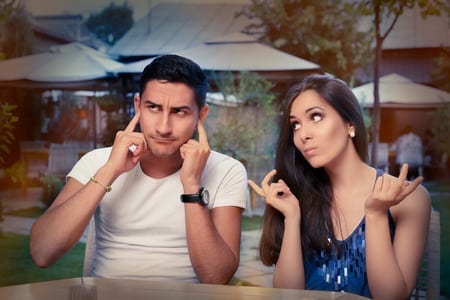Do You Really Take Responsibility For Your Life?

There’s probably not a person alive who hasn’t felt powerless at some time or another. Childhood experiences in which you didn’t have much (or any) control, dishonesty at the hands of another, plain bad luck — they’re all part of being a human being. And certainly many of us have experienced horrific life circumstances that in one way or another warranted our feeling victimized and powerless as well.
Yet for most of us, for most situations in our lives, power is actually something we do have, though sometimes we don’t allow ourselves to acknowledge it.
Many couples are stuck in a power dynamic that keeps them from acknowledging their own individual strengths and potential. It happens a lot: Sometimes we’re convinced the other person is to blame for our unhappiness and, while it might be easier (and even momentarily comforting) to play the victim, blaming our partner for our own lack of power doesn’t feel good or serve us in the long run.
That’s because one simple truth — I am responsible for myself — sits at the core of creating the rewarding life we want. It’s the key to being happy with ourselves and creating happy relationships.
What’s Your Relationship Dynamic?
You’re heard it before: It takes two to tango. Cliché but true, it means that no matter what’s going on, both partners are contributing to every relationship. When yours isn’t going well, it’s easy to look at your partner and judge his or her contribution. “He’s not doing this!” “She’s doing that again!” And yet every relationship, good or bad, is always the result of a contribution from both partners — even if it’s as simple as one person putting up with behaviour from the other that shouldn’t be tolerated.
Actions don’t happen in a vacuum, though. In a relationship, our behaviour is always in constant interaction with our partner’s. Good or bad, it’s creates a constant feedback loop and, for certain problem patterns between partners, it’s normal for each person to be involved in their creation. Returning to our tango metaphor, think of two dancers performing a beautiful, complex dance: They’re creating the whole thing together with their own individual actions.
Excuses, Excuses
Relationships work the same way, and taking responsibility for one’s own actions is not only the decent thing to do, it’s also a great way to begin to effect powerful and positive changes for the whole relationship. Excuses that keep you from taking responsibility for yourself only prohibit the two of you from growing. Here are some of the most common ones:
• “I am doing the best I can.” Probably one of the most popular excuses, this one makes a mockery of being accountable and sets the bar very, very low as the standard for one’s behavior.
• “I didn’t mean to hurt you.” One of the classics among not-taking-responsibility-for-yourself excuses. If you didn’t mean to hurt the other person, what exactly did you mean when you did it? (And when you did, were you really doing the best you could?)
• “I’ll try.” Really? Trying is far from a wholehearted undertaking. It’s inherently partial, and almost always falls short of its intended actions. “Trying” is often heavy with talk and light on action. It usually means you’re resisting something about taking committed action — and it’s worth getting to the bottom of what exactly that resistance might be.
• “I won’t confront you because I don’t want to hurt you.” While this excuse sounds admirable on the surface, it’s actuality less about sparing your partner pain than it is about directly facing your own. In time, this excuse can actually hurt your partner (and your relationship) more than directly disclosing what’s bothering you right now.
Do any of these excuses sound familiar? Have you used any yourself?
Here’s some other questions you may want to think about.
In My Life in General:
In what areas of my life do I feel I’m a victim?
In those areas, what resentment do I feel?
Whom do I blame?
When I connect with this feeling of resentment and blame, does it feel heavy or light?
How can I reframe this situation and understand that I have more power?
How does it feel to know I have some real power and choices? Scary? Exciting?
In Our Relationship:
Do I take responsibility for my contribution to problems we might have?
Do I tend to blame you?
Do I feel that you take responsibility for your contributions to the problems we have in our relationship?
Do I make excuses for taking responsibility for myself in our relationship?
Do I feel you make excuses for taking responsibility for yourself in our relationship?
OUR MAJOR MARRIAGE COUNSELLING LOCATIONS:
See all of our Relationship Counselling Melbourne locations.
See all of our Relationship Counselling Brisbane locations.
See all of our Relationship Counselling Perth locations.
See all of our Relationship Counselling Adelaide locations.

